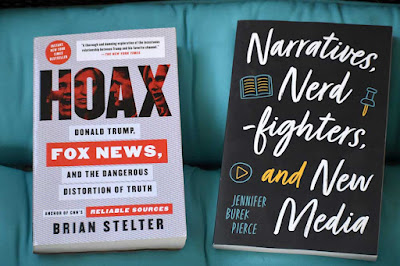 |
| Two books about media I have read in 2022. |
I’ve recently read two very different books about media, and they prompt me to marvel a bit about how our media consumption can, at the same time, unite and divide us.
“Narratives, Nerd-fighters and New Media” by Jennifer Burek Pierce explores the geeky corner of the internet created by the Vlog Brothers, Hank and John Green. The book describes how the two authors and media producers have created and facilitated a global village of readers and online content creators, centered at first about John Green’s books and their Vlog Brothers channel.
The other book, “Hoax,” by Brian Stelter explores the fake narrative of the 2020 election that took hold and led to the Jan. 6, 2021 attempt to overthrow a legal, and relatively clean, election.
First, the book about uniting. In “Narratives,” Burek Pierce briefly reviews the reach of an online community crated by the Green brothers. Hank Green in particular has been a driving force behind the creation of many interesting corners of You Tube through the company Complexity. SciShow, Crash Course and others are places where one goes to satisfy curiosity.
John has been involved in some of those projects, and is a well-known young adult novelist. In recent years, Hank also has joined John as a novelist, writing two science fiction books. One central theme of Burke Pierce’s book is how central reading is to the online community that centers around the brothers. How reading, and sharing about reading, creates a sense of place.
Place and community can be promoted by the internet. And the Green brothers are to be credited because they use their moment of fame not just for self-gratification, but for their ongoing “project to reduce world suck” in which worthwhile causes, like health care in Sierra Leone, are supported.
“Hoax” is a different kind of book about different media. Stelter describes the weird, symbiotic relationship between Fox News and former President Donald Trump—how, due to his media consumption habits, Trump picked up many of his key talking points from Fox News programs.
And, driven by ratings successes, Fox evolved to emphasize the opinion programming that Trump favored. Journalists and journalism were squeezed out of a network whose name has “news” in it. As the corrosive and destructive Trump presidency went on, it seems like Fox was coopted by the MAGA movement to the point where it was almost captive to the whims of Trump.
To me, one key to the weird new era we inhabit is the influence of social media in the form of things like Facebook and YouTube—where community can form that, unlike nerd fighters, doesn’t seek to build a club of readers so much as a mutually cheering squad that pushes and promotes the most extreme views. What I mean is that the community-building power of the internet can work strongly against the community as a whole. And the incentives to echo more extreme views is something Hank Green ruminated about in the aftermath of the Jan. 6, 2021 insurrection at the U.S. Capital:
The body politic seems to mostly be suffering from the community building being done by election deniers and the MAGA crowd—but I don’t think those negative effects of incentivizing extremism are exclusive to the political right.
Anyway, one interesting aspect of "Hoax" is that, due to its time and place and sizeable audience, part of what drove the Trump years of insanity was Sean Hannity and his kin on an old-school cable news channel.
Of the two books, I enjoyed “Narratives” more, but then I’m a casual inhabitant of the neighborhood it describes. Perhaps “Hoax” is on a more important topic. The books suffers from its chatty, gossipy tone, where who is sleeping with whom gets in the way of the main narrative but is still worth the time to unpack some of what went on as Trump and Fox grew together.
But books both are interesting reads on recent moments in media history. And both remind us that media often rewards the most noise, which can be a detriment to us if we remain unaware of that tendency.
No comments:
Post a Comment